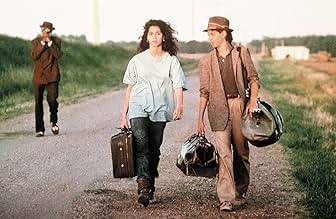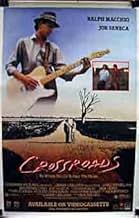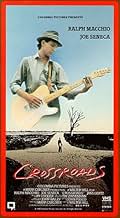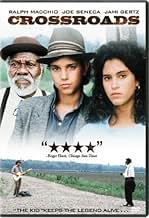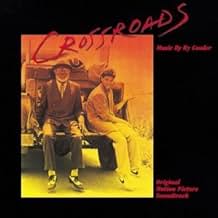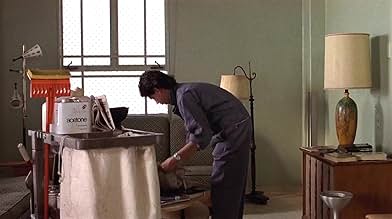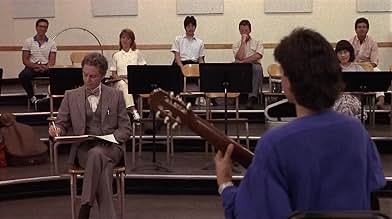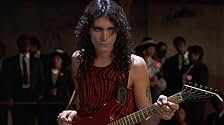A wannabe blues-guitar virtuoso finds an old blues player and hopes he can teach him a long-lost song by legendary musician, Robert Johnson.A wannabe blues-guitar virtuoso finds an old blues player and hopes he can teach him a long-lost song by legendary musician, Robert Johnson.A wannabe blues-guitar virtuoso finds an old blues player and hopes he can teach him a long-lost song by legendary musician, Robert Johnson.
- Awards
- 1 win
Tom Donaldson
- John McGraw
- (as Tex Donaldson)
- Director
- Writer
- All cast & crew
- Production, box office & more at IMDbPro
Storyline
Did you know
- Trivia"Eugene's Trick Bag", the updated classical piece at the film's climax, is largely based on Niccolò Paganini's "Caprice #5". According to myth, Paganini sold his soul to the devil for his musical skills. Steve Vai replicates Paganini's legendary rolling eyes, long unkempt hair and gaunt look.
- GoofsAt the time the movie was filmed, Julliard did not offer classes in classical guitar.
- Quotes
Willie Brown: The blues ain't nothin' but a good man feelin' bad, thinkin' 'bout the woman he once was with.
- ConnectionsFeatured in At the Movies: Salvador/Smooth Talk/Crossroads/Turtle Diary (1986)
Featured review
Other than "The Blues Brothers," I can't think of another modern film about the Blues as good as Walter Hill's "Crossroads." In the film, Ralph Macchio plays Eugene, an aspiring classical guitar prodigy at Julliard who is fascinated with the blues. He tracks down Willie Brown, one of the last living blues legends from the 40's, played by Joe Seneca. Eugene thinks Willie has the last song written by (real life) legendary Bluesman Robert Johnson, that was never recorded (the story is loosely tied to the life of Johnson). Eugene believes he can assist Willie is resurrecting the song and giving it to the world. However, Willie has other plans including teaching Eugene the true meaning of Blues music that requires a trip back to Willie's stomping ground on the Delta.
This is Hill's best film. Like "Crossroads", many of his films have interracial lead characters and Hill always gives a unique, honest slant on racism and social differences among these types of relationships (or if its an amicable relationship - the lack thereof). The script may be a little thin for some (Jami Gertz's character is a little weak, and she resorts to overacting too often), but Joe Seneca carries the movie with weathered grace as Eugene's fatigued hero who hopes of correcting his shady past in order to save his future. Ralph Macchio expertly plays a naive, impressionable teenager whose skill and love as a musician ultimately generates his confidence and even bull-headedness: he's a blues guitarist who knows what to play but not how to play it. And who can forget the "cutting heads" showdown at the end of the film? Eugene fights tool-and-nail against master guitarist Steve Vai as Jack Butler. The duel is ABSOLUTELY incredible, and no matter how many times I've seen it, I never get bored.
The tone and pacing of this film is tempered, quiet and casual, with none of its plot twists dipped in melodrama for maximum effect. Willie Brown's description of the South is never fully realized on screen, even it's bleakness is absent of any vivid cinematography, but this is overall a great film. As Willie tells Eugene late in the film, "Blues ain't nothin' but a good man feelin' bad." I love this movie!
This is Hill's best film. Like "Crossroads", many of his films have interracial lead characters and Hill always gives a unique, honest slant on racism and social differences among these types of relationships (or if its an amicable relationship - the lack thereof). The script may be a little thin for some (Jami Gertz's character is a little weak, and she resorts to overacting too often), but Joe Seneca carries the movie with weathered grace as Eugene's fatigued hero who hopes of correcting his shady past in order to save his future. Ralph Macchio expertly plays a naive, impressionable teenager whose skill and love as a musician ultimately generates his confidence and even bull-headedness: he's a blues guitarist who knows what to play but not how to play it. And who can forget the "cutting heads" showdown at the end of the film? Eugene fights tool-and-nail against master guitarist Steve Vai as Jack Butler. The duel is ABSOLUTELY incredible, and no matter how many times I've seen it, I never get bored.
The tone and pacing of this film is tempered, quiet and casual, with none of its plot twists dipped in melodrama for maximum effect. Willie Brown's description of the South is never fully realized on screen, even it's bleakness is absent of any vivid cinematography, but this is overall a great film. As Willie tells Eugene late in the film, "Blues ain't nothin' but a good man feelin' bad." I love this movie!
- JawsOfJosh
- Nov 2, 2000
- Permalink
Details
Box office
- Gross US & Canada
- $5,839,031
- Opening weekend US & Canada
- $2,071,680
- Mar 16, 1986
- Gross worldwide
- $5,839,031
- Runtime1 hour 39 minutes
- Color
- Sound mix
- Aspect ratio
- 1.85 : 1
Contribute to this page
Suggest an edit or add missing content





